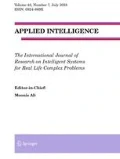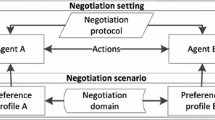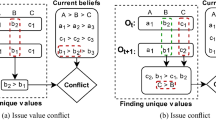Abstract
Bargaining is an effective paradigm to solve the problem of resource allocation. The consideration of factors such as bounded rationality of negotiators, time constraints, incomplete information, and complexity of dynamic environment make the design of optimal strategy for one-shot bargaining much tougher than the situation that all bargainers are assumed to be absolutely rational. Lots of prediction-based strategies have been explored either based on assuming a finite number of models for opponents, or focusing on the prediction of opponent’s reserve price, deadline, or the probabilities of different behaviors. Following the methods of estimating opponent’s private information, this paper gives a strategy which improves the BLGAN strategy to adapt to various possible bargaining situations and deal with multifarious opponents. In addition, this paper compares the improved BLGAN strategy with related work. Experimental results show that the improved BLGAN strategy can outperform related ones when faced with various opponents, especially the agents who frequently change their strategies for anti-learning.





Similar content being viewed by others
References
Rosenschein JS, Zlotkin G (1994) Rules of encounter: designing conventions for automated negotiation among computers. MIT Press, Cambridge, pp 1–171
Sim KM (2009) Unconventional negotiation: survey and new directions. In: Proceedings of the 9th international conference on electronic business, pp 901–907
Sim KM (2010) Grid resource negotiation: survey and new directions. IEEE Trans Syst Man Cybern, Part C, Appl Rev 40(3):245–257
Kersten G, Michalowski W, Szpakowicz S, Koperczak Z (1991) Restructurable representations of negotiation. Manag Sci 37(10):1269–1290
Lomuscio A, Wooldridge M, Jennings NR (2003) A classification scheme for negotiation in electronic commerce. Int J Group Decis Negotiation 12(1):31–56
Gwak JH, Sim KM (2013) A novel method for coevolving PS-optimizing negotiation strategies using improved diversity controlling EDAs. Appl Intell 38(3):384–417
Wu D, Baron O, Berman O (2009) Bargaining in competing supply chains with uncertainty. Eur J Oper Res 197(2):548–556
Sim KM (2012) Agent-based cloud computing. IEEE Trans Serv Comput 5(4):564–577
Sim KM (2013) Complex and concurrent negotiations for multiple interrelated e-markets. IEEE Trans Cybern 43(1):230–245
Sim KM (2010) Towards complex negotiation for cloud economy. Lect notes comput sci, vol 6104. Springer, Berlin, pp 395–406
Son S, Sim KM (2012) A price-timeslot negotiation for cloud service reservation. IEEE Trans Syst Man Cybern, Part B, Cybern 42(3):713–728
Sim KM, Shi B (2010) Concurrent negotiation and coordination for controlling grid resource co-allocation. IEEE Trans Syst Man Cybern, Part B, Cybern 40(2):753–766
Sim KM (2006) A survey of bargaining models for grid resource allocation. ACM SIGECOM: E-Commerce Exch 5(5):22–32
Sim KM (2006) G-commerce, market-driven g-negotiation agents and grid resource management. IEEE Trans Syst Man Cybern, Part B, Cybern 36(6):1381–1394
Sandholm T, Vulkan N (1999) Bargaining with deadlines. In: Proceeding of the national conference on artificial intelligence, pp 44–51
Faratin P, Sierra C, Jennings NR (1998) Negotiation decision functions for autonomous agents. Robot Auton Syst 24(3–4):158–182
Hou CM (2004) Modeling agents behavior in automated negotiation. Technical report. KMI-TR-144, Open University
Lee FM, Li LH, Chen PH (2005) A study on dynamic bargaining strategy under time constraints and with incomplete information. In: IEEE/WIC/ACM inter conf intelligent agent technology, pp 640–645
Brozostowski J, Kowalczyk R (2006) Predicting partner’s behavior in agent negotiation. In: 5th international joint conference on autonomous agents and multiagent systems, pp 355–361
Sim KM, Guo Y, Shi B (2009) BLGAN: Bayesian learning and genetic algorithm for supporting negotiation with incomplete information. IEEE Trans Syst Man Cybern, Part B, Cybern 39(1–2):198–211
ANAC (2010) Automated negotiating agents competition, http://mmi.tudelft.nl/negotiation/index.php/Automated_Negotiating_Agents_Competition_(ANAC). Accessed 18 July 2013
Raiffa H (1982) The art and science of negotiation. Harvard University Press, Cambridge, pp 1–300
Yang YP, Singhal S, Xu YJ (2009) Offer with choices and accept with delay: a win-win strategy model for agent based automated negotiation. In: 30th international conference in information systems. Paper 180
Malhotra D, Bazerman M (2008) Psychological influence in negotiation: an introduction long overdue. J Manag 34(3):509–531
Sun R (2009) Motivational representations within a computational cognitive architecture. Cogn Comput 1(1):91–103
Tauber EM (1972) Why do people shop? J Mark 36(4):46–49
Lewicki RJ, Litterer JA, Minton JM, Saunders DM (1994) Irwin Negotiation, 2nd edn. Burr Ridge, pp 1–50
Baumeister RF, Zhang L, Vohs KD (2004) Gossip as cultural learning. Rev Gen Psychol 8:111–121
Ji SJ, Leung HF (2010) An adaptive prediction-regret driven strategy for bilateral bargaining. In: 22nd international conference on tools with artificial intelligence, vol 2, pp 11–14
Bahrammirzaee A, Chohra A, Madani K (2013) An adaptive approach for decision making tactics in automated negotiation. Appl Intell, Published online: 20 April 2013
Gwak JH, Sim KM (2013) An augmented EDA with dynamic diversity control and local neighborhood search for coevolution of optimal negotiation strategies. Appl Intell 38(4):600–619
Acknowledgement
This paper is supported by the Natural Science Foundation of China (Nos. 71240003, 71303140, 61170079, 61202152), the Natural Science Foundation of Shandong Province (No. ZR2012FM003), the National key basic research and development plan (973) of China (No. 2012CB724106, No. ZR2013FM023) and the Shandong Provincial International Cooperation Program for Excellent Lectures of 2009.
Author information
Authors and Affiliations
Corresponding author
Rights and permissions
About this article
Cite this article
Ji, Sj., Zhang, Cj., Sim, KM. et al. A one-shot bargaining strategy for dealing with multifarious opponents. Appl Intell 40, 557–574 (2014). https://doi.org/10.1007/s10489-013-0497-6
Published:
Issue Date:
DOI: https://doi.org/10.1007/s10489-013-0497-6




